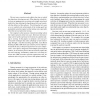Free Online Productivity Tools
i2Speak
i2Symbol
i2OCR
iTex2Img
iWeb2Print
iWeb2Shot
i2Type
iPdf2Split
iPdf2Merge
i2Bopomofo
i2Arabic
i2Style
i2Image
i2PDF
iLatex2Rtf
Sci2ools
105
click to vote
ICSM
2006
IEEE
2006
IEEE
Using the Case-Based Ranking Methodology for Test Case Prioritization
The test case execution order affects the time at which the objectives of testing are met. If the objective is fault detection, an inappropriate execution order might reveal most faults late, thus delaying the bug fixing activity and eventually the delivery of the software. Prioritizing the test cases so as to optimize the achievement of the testing goal has potentially a positive impact on the testing costs, especially when the test execution time is long. Test engineers often possess relevant knowledge about the relative priority of the test cases. However, this knowledge can be hardly expressed in the form of a global ranking or scoring. In this paper, we propose a test case prioritization technique that takes advantage of user knowledge through a machine learning algorithm, Case-Based Ranking (CBR). CBR elicits just relative priority information from the user, in the form of pairwise test case comparisons. User input is integrated with multiple prioritization indexes, in an itera...
Related Content
| Added | 11 Jun 2010 |
| Updated | 11 Jun 2010 |
| Type | Conference |
| Year | 2006 |
| Where | ICSM |
| Authors | Paolo Tonella, Paolo Avesani, Angelo Susi |
Comments (0)

